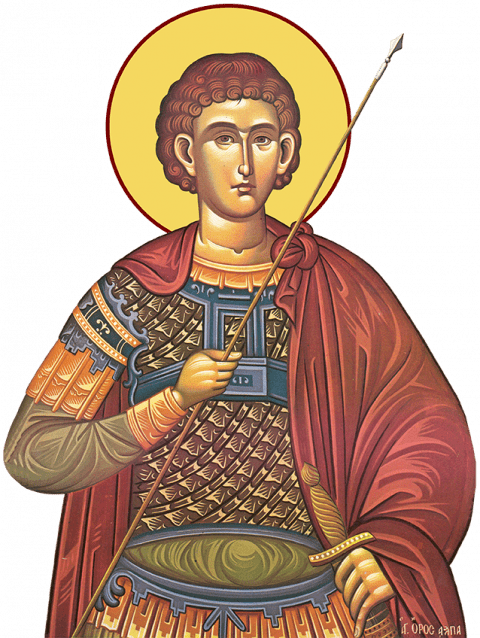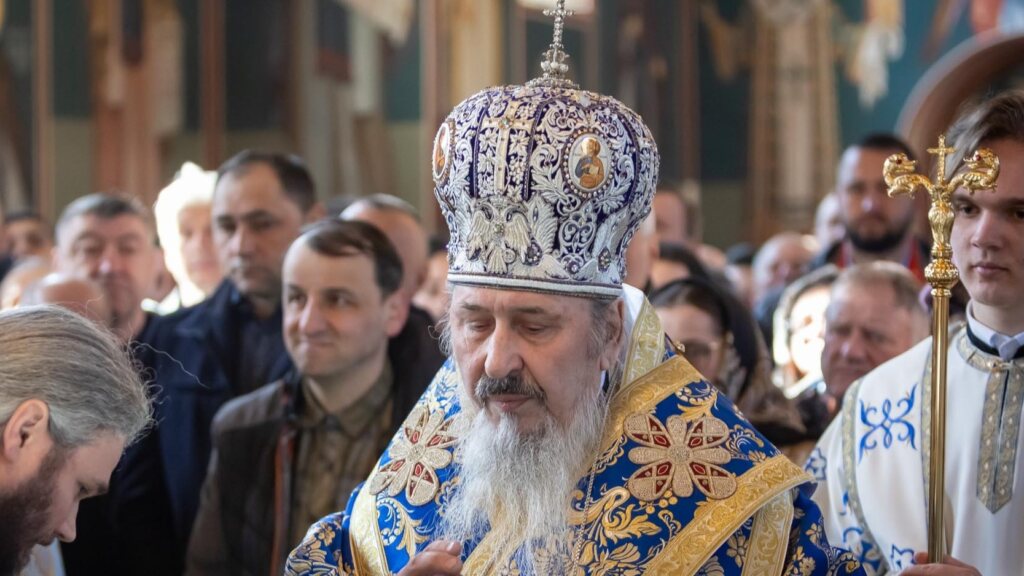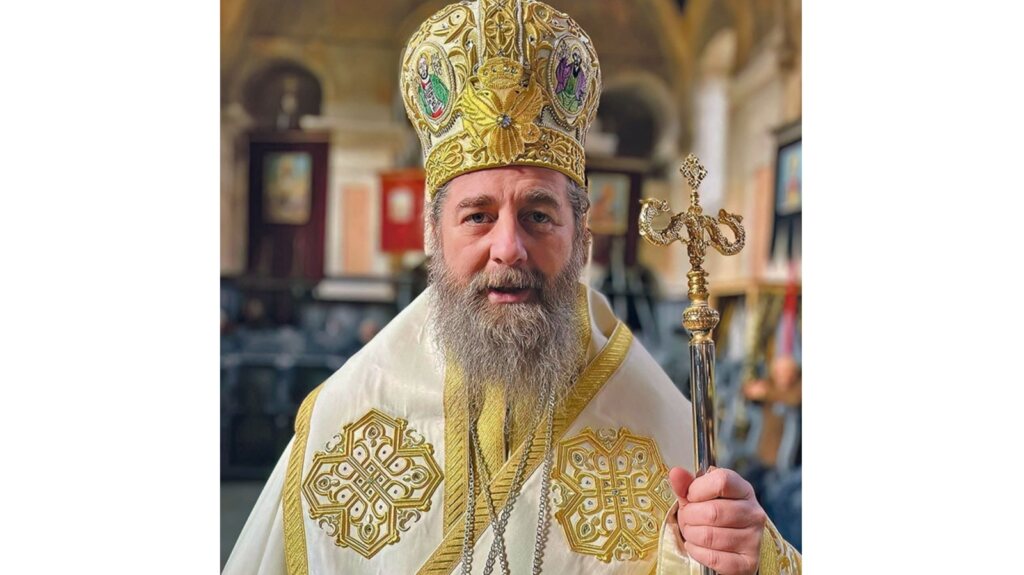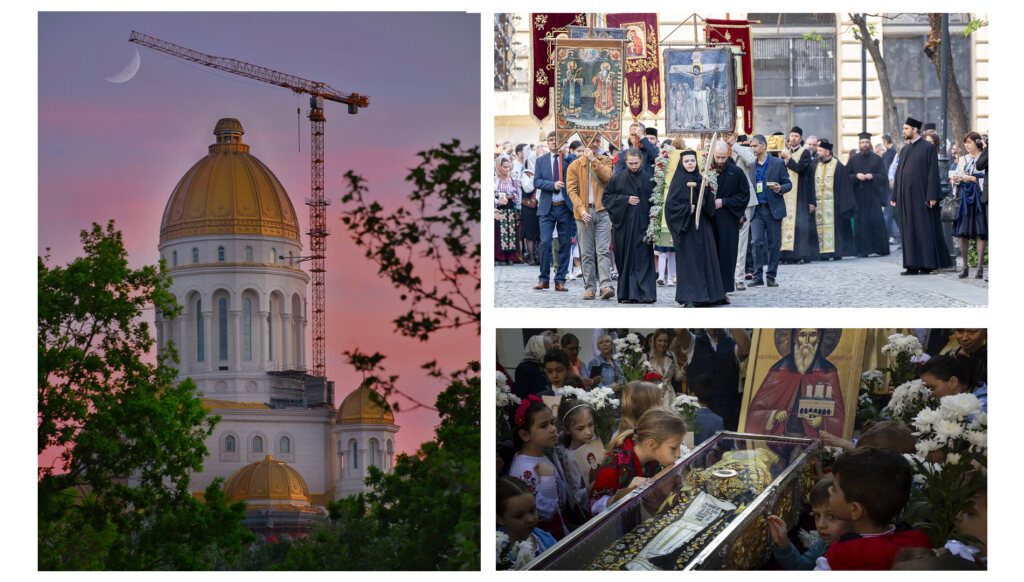Greatmartyr Procopius of Caesarea and his mother Theodosia
The Holy Great Martyr Procopius, in the world Neanius, a native of Jerusalem, lived and suffered during the reign of the emperor Diocletian (284-305).
His father, an eminent Roman by the name of Christopher, was a Christian, but the mother of the saint, Theodosia, remained a pagan. He was early deprived of his father, and the young child was raised by his mother.
Having received an excellent secular education, he was introduced to Diocletian in the very first year of the emperor’s accession to the throne, and he quickly advanced in government service. Towards the year 303, when open persecution against Christians began, Neanius was sent as a proconsul to Alexandria with orders to mercilessly persecute the Church of God.
On the way to Egypt, near the Syrian city of Apamea, Neanius had a vision of the Lord Jesus, similar to the vision of Saul on the road to Damascus. A divine voice exclaimed, “Neanius, why do you persecute Me?”
Neanius asked, “Who are you, Lord?”
“I am the crucified Jesus, the Son of God.”
At that moment a radiant Cross appeared in the air. Neanius felt an inexpressible joy and spiritual happiness in his heart and he was transformed from being a persecutor into a zealous follower of Christ. From this point in time Neanius became favorably disposed towards Christians and fought victoriously against the barbarians.
The words of the Savior came true for the saint, “A man’s foes shall be those of his own household” (Mt. 10:36). His mother, a pagan herself, went to the emperor to complain that her son did not worship the ancestral gods. Neanius was summoned to the procurator Judaeus Justus, where he was solemnly handed the decree of Diocletian.
Having read through the blasphemous directive, Neanius quietly tore it up before the eyes of everyone. This was a crime, which the Romans regarded as an “insult to authority.” Neanius was held under guard and in chains sent to Caesarea of Palestine, where the Apostle Paul once languished. After terrible torments, they threw the saint into a dark prison. That night, a light shone in the prison, and the Lord Jesus Christ Himself baptized the suffering confessor, and gave him the name Procopius.
Repeatedly they led Saint Procopius to the courtroom, demanding that he renounce Christ, and they subjected him to more tortures. The stolidity of the martyr and his fiery faith brought down God’s abundant grace on those who witnessed the execution.
Inspired by the example of Procopius, many of the holy martyr’s former guards and Roman soldiers went beneath the executioner’s sword together with their tribunes Nikostrates and Antiochus. Twelve Christian women received martyr’s crowns, after they came to the gates of the Caesarea Praetorium.
Struck by the great faith and courage of the Christians, and seeing the firmness of her son in bearing terrible sufferings, Theodosia became repentant and stood in the line of confessors and was executed. Finally the new procurator, Flavian, convinced of the futility of the tortures, sentenced the holy Great Martyr Procopius to beheading by the sword. By night Christians took up his much-tortured body, and with tears and prayers, they committed it to the earth. This was the first martyrdom at Caesarea (303).
Troparion — Tone 4
Your holy martyr Procopius, O Lord, / through his suffering has received an incorruptible crown from You, our God. / For having Your strength, he laid low his adversaries, / and shattered the powerless boldness of demons. / Through his intercessions save our souls!
Martyr Epictetus the Presbyter and Monkmartyr Astion
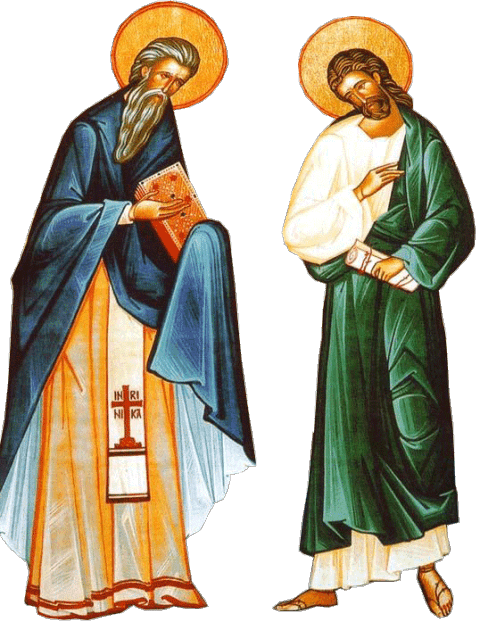
The monastic martyrs Epictetus and Astion lived in Bithynia on the southwest coast of the Black Sea during the reign of the Roman emperor Diocletian (284-305). From his youth, Saint Epictetus had dedicated his life to God, and studied to acquire knowledge of the Gospel.
He entered a monastery, and later was found worthy to be ordained to the holy priesthood. Proclaiming the Gospel of Christ, the saint converted many people to Christianity. God granted Epictetus the gift of wonderworking, and he healed many people troubled by unclean spirits, or afflicted with other maladies.
One day while out for a stroll, the illustrious youth Astion met Saint Epictetus. During a long conversation Saint Epictetus enlightened Astion, sowing the seed of God’s Word in the young man’s soul. He spoke to him about the only true God, about the great value of the immortal human soul, and about fleeting worldly pleasures.
Astion came to believe in Christ and was baptized. Soon after this, he also became a monk. Since Christians were being persecuted in Bithynia, he asked Saint Epictetus if they might travel together to some distant land where they could dedicate their lives completely to God.
Boarding a ship, Saints Epictetus and Astion journeyed to Scythia and settled among the pagan Slavs near the Roman outpost of Halmyris in the province of Histria south of the mouth of the Danube. The city was the site of a military fort and a base for the Roman fleet which patrolled the Danube and the Black Sea.
When they arrived at Halmyris in 273, Saint Epictetus was forty-seven years old, and Saint Astion was only eighteen. During the next seventeen years, the saints spent their lives in prayer and fasting, and performed many miracles.
The God-pleasing lives of the monks could not remain hidden from others for very long. People afflicted by various illnesses or oppressed by evil spirits came to the saints seeking relief. Even pagans asked the holy ascetics for help, and after being healed of their afflictions, they embraced Christianity.
Saint Epictetus once healed a fifteen-year-old deaf and dumb boy by praying and breathing on him three times. More than a thousand people became Christians after witnessing this miracle. Saint Astion once cured a man whose legs and toes were crushed when he fell from a building.
Latronianus, the military commander of the district, arrived in Halmyris in 290 on an official visit of inspection. The pagan priests wasted no time in complaining to him about Saints Epictetus and Astion. They denounced the two men from Bithynia, accusing them of converting people to Christianity through sorcery, and persuading them not to offer sacrifice to the pagan gods.
The saints were arrested and interrogated by Latronianus, who tried to find out their names and where they were from. Their only reply was, “We are Christians.” Latronianus had them tortured in an effort to make them abandon their Christian beliefs.
After thirty days in prison without food and water, the holy martyrs Epictetus and Astion were once again brought before Latronianus. They remained steadfast and ready to endure even more suffering for Christ. The commander declared that Epictetus and Astion were traitors, and ordered them to be tortured and beheaded.
Saints Epictetus and Astion received the crown of martyrdom on July 8, 290. At first, they were buried in an unknown spot. Later, their holy relics were transferred into the basilica built in the fourth century by Saint Constantine the Great (May 21) at Halmyris.
Archaeologists discovered the holy relics of Saints Epictetus and Astion at Halmyris in 2001. The bones were scattered about in two rooms of a burial crypt, indicating that the tomb had been vandalized, perhaps in the sixth century.
Scientific tests on the bones revealed that one of the men was approximately sixty-four years old, and the other about thirty-five. This is consistent with the ages of the two saints as given in the written accounts of their martyrdom. The bones also indicate that the two had been beheaded.
The holy relics of Saints Epictetus and Astion were reburied in 2001 by Archbishop Theodosius of Tomis (Romania).
Troparion
The ones similar in honour with the unmercenary saints, the wise priest Epictetus and his zealous disciple Astion, the Martyrs of Christ and the adornment of Dobrudja, come let us praise them all the faithful, saying: Rejoice, you who always intercede for our souls.
Tr by oca.org
